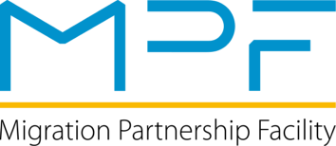Three recent graduates from the spring 2024 cohort of 25 students for the intensive three-month course under the “Migration Management Diploma Programme (MMDP)” have shared their views about the programme and how they plan to apply the new knowledge gained in their respective institutions.
Based at the United Nations University – Maastricht Economic and Social Research Institute on Innovation and Technology (UNU-MERIT), the full-time three-month course is addressed for partner country-government officials working in migration policy and funded by the EU through the Migration Partnership Facility.
Now in its second phase, the programme covers areas such as migration management and protection, migration and development, and migration policies, encouraging participants to apply a holistic approach to migration management and guide them in how to mainstream migration into across sectors, agencies and government levels.
Peer-to-peer learning is a central component of the training programme; reinforced by interactive sessions, networking opportunities and field visits to key migration institutions in Brussels, Geneva and The Hague.

"Many stereotypes were shattered after comparing data with ongoing narratives surrounding migration”
Ana Tavartkiladze
Attaché Consular Department
Ministry of Foreign Affairs, Georgia
Tell us a little bit about yourself.
I trained in Law and have worked in Consular Affairs for over six years now. I wanted to learn more about safe mobility for migrants and protection of human rights. My work experience has allowed me to expand knowledge on migration and to enhance my awareness of vulnerabilities individuals or groups face within any given migration process. This is where my greater interest and enthusiasm in migration studies stems from.
As a result, when I heard about the programme and its courses, I knew it was the perfect chance to shape and navigate through the knowledge I already had. Moreover, I was offered an opportunity to deepen my understanding and apply it to effective policy-making, while learning from respected experts I admire. I was excited about how this programme could significantly enhance my ability to contribute to meaningful and impactful migration policies.
How was your overall experience?
The MMDP journey of three months resulted not only in professional but also in personal transformation. The programme has multifaceted goals embedded, refining you as a person and professional. From all the other aspects that make MMDP special over any others I have taken before, I would first highlight a comprehensive and hands-on approach, which pushes participants beyond their thinking limits and deepens understanding of migration issues. As for the second, the possibility to engage with experts and peers from diverse backgrounds fosters a collaborative learning environment and helps you to step out of your shell.
Additionally, I would mention the Migration Studies and Migration Data modules that challenged all the participants in many ways. However, it eventually equipped me with the ability to analyse and interpret data effectively, as reading the stories behind the data was a skill I lacked before. This was indeed groundbreaking as many stereotypes were shattered after comparing data with ongoing narratives surrounding migration. The module on Migration data has proven invaluable in my work, as I can now present data-driven insights that challenge biases and inform policy discussions. Overall, the MMDP was an exceptional learning journey, equipping participants with knowledge and skills valuable to meaningful migration management and policy development. Moreover, this journey was also an opportunity to enrich my professional network.
How do you plan to apply and share the knowledge gained?
Now, as we end our impactful journey, I see how my professional journey is divided into the phases before and after the MMDP. I am sincerely grateful to all the stakeholders who made this transformative programme happen. As for knowledge sharing, regular group meetings and brainstorming are important work practices we apply in my department. This working culture helps us identify challenges and find ways to address or prevent them. This is where I can envision myself sharing insights and acquired knowledge with my colleagues so we can collaborate on evidence-based guidance for our government.
The MMDP programme has equipped me with valuable knowledge and skills, alongside a newfound confidence. I am now ready to tackle any new, real challenges I might face at work. From this point onwards, I have many insights I would love to put into practice. I have also recognised the crucial role of solid consular services in helping migrants feel secure and build a stronger life whilst abroad, thereby significantly contributing to their country's development.
What are the main take-aways from this diploma?
As I noted earlier, this programme deepens participants' understanding of migration issues and gaining practical skills, and goes beyond in providing personal growth by instilling confidence to contribute to meaningful and impactful migration policies. Enhancing analytical skills, visual communication, data interpretation, and presentation capabilities, along with benefiting from a collaborative learning environment, are invaluable takeaways but definitely not exhaustive.
The hands-on approach and the opportunity to engage with the field's prominent experts and peers from diverse backgrounds has fostered innovative thinking and helped us exchange best practices and push beyond our subjectivity. These all have resulted in acknowledging the importance of solid consular services, adherence to international standards, increased cooperation, evidence-based policy decisions, effective information campaigns to combat irregular migration, and data systematization.
I would highly recommend the MMDP programme and raise awareness to anyone interested in migration studies. All the modules embedded into the courses are incredibly intensive, demanding full commitment and engagement from participants, so a genuine passion for migration issues is essential for prospective participants.
All future participants should be prepared to collaborate with peers from diverse backgrounds. Respect and openness to new ideas and practices are a must, as this helps the programme to enrich the learning environment and broaden participants’ perspectives on migration-related topics.
Additionally, given the programme's emphasis on practical approaches and data-driven decision-making, they should also be ready to apply the knowledge they have gained to real-world scenarios and to build new ones.
Read the first and second parts of this series, featuring Adrian Owiny from the Ministry of Internal Affairs of Uganda and Nathalie Andria-Manantena from the Ministry of Foreign Affairs in Madagascar.
Applications for the next cohort of students for the MMDP are now open until October 1 2024. Visit the UNU-Merit website for more details.
NB. This interview was edited for brevity and clarity.
